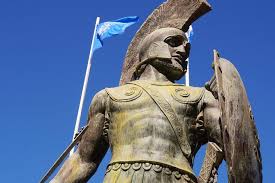Tag Archives: Aeschylus
Aeschylus (525 BC – 456 BC) was a playwright of ancient Greece and is considered the father of Tragedy. He wrote between 70 and 90 plays, won 28 competitions and completely altered the face of the stage… As well as being an important dramatist, he was a successful military man, having taken part in both
Sparta Vs. Athens

By Van Bryan, Contributing Writer, Classical Wisdom SPARTA Sparta, also known by its ancient name Lacedaemon in honor of their legendary founder, is often considered to have been the most dominant military presence in ancient Greece. Their infantry soldiers were said to have been among the most skilled and fearsome warriors of the ancient world.
Euripides, The Great Greek Tragedian
By Eldar Balta, Contributing Writer, Classical Wisdom Euripides’ Early life Born on Salamis Island in 480 BC to mother Cleito and father Mnesarchus, Euripides’ destiny was foretold in a prophecy given to his father. The Oracle fated that Euripides would one day hold the “crowns of victory”. Mnesarchus did not lose any time insisting that
The Dangerous Danaids
By Carly Silver, Contributing Writer, Ancient Origins The ancient Greeks had no problem painting their mythological women as murderesses. Among the most lethal ladies were the Danaids, the fifty daughters of a king whose crimes condemned them to Sisyphean fates in the Underworld. But what was so bad about them that the Roman poet Horace
The Unlucky Seven Against Thebes
Seven warriors killing seven other soldiers in front of seven gates. You’d think that story would forever condemn the number to enmity. But Aeschylus’ Seven Against Thebes makes no comment on the conspicuous symmetry of the legend’s numeral element. Maybe the seven city portals warranted warriors to both attack and protect them. Unfortunately if you are seeking
The Warring Writer: Aeschylus Tragedy
Let’s say you are considered the “father of tragedy”. Even in your own lifetime, everyone knows you have revolutionized drama and changed the theatre game. Do you think it would be mentioned on your tomb? Surely a throw away reference at least? But no, not for Aeschylus. The man who wrote between 70 and 90








